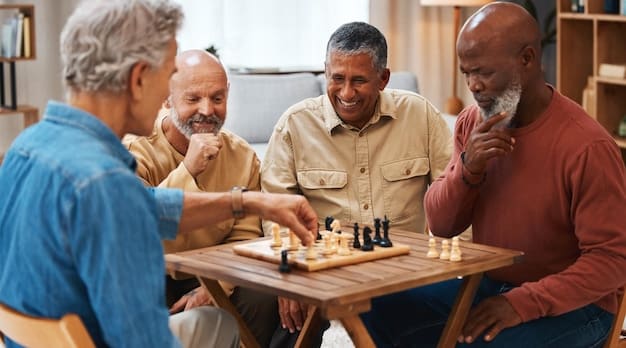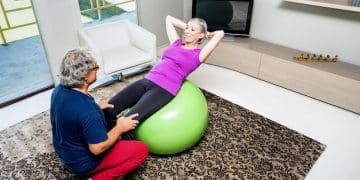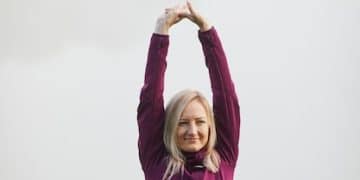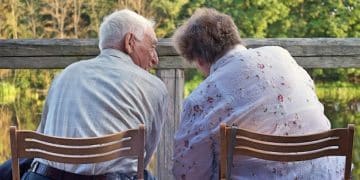Boost Brain Power: Seniors’ Cognitive Function Activities in 2025

Seniors can significantly enhance cognitive function in 2025 through engaging in diverse brain-boosting activities like lifelong learning, targeted cognitive exercises, mindful practices, and consistent physical activity, fostering neuroplasticity and overall mental wellness.
As we navigate towards 2025, the conversation around aging gracefully is increasingly centered on maintaining sharp minds. Understanding how can seniors maintain cognitive function with brain-boosting activities in 2025 is not just a scientific query, but a practical roadmap for a fulfilling later life. This article delves into actionable strategies, backed by evolving research, to empower seniors in their quest for lasting mental acuity, moving beyond conventional wisdom to embrace cutting-edge approaches and holistic well-being.
The Science of Brain Health in Aging: A 2025 Perspective
The human brain is a remarkable organ, capable of adapting and forming new connections throughout life—a phenomenon known as neuroplasticity. For seniors, understanding this intrinsic ability is crucial. While some cognitive changes are a natural part of aging, a proactive approach can significantly mitigate decline and even enhance specific intellectual capabilities.
Research in 2025 continues to underscore the dynamic interplay between lifestyle choices and brain health. It’s no longer just about preventing decline; it’s about actively promoting cognitive vitality. The concept of “cognitive reserve” – the brain’s ability to cope with damage by using existing neural networks more efficiently or by recruiting alternative networks – is gaining prominence. By engaging in mentally stimulating activities, seniors are effectively building this reserve, making their brains more resilient against the challenges of aging.
Understanding Cognitive Decline and Resilience
Cognitive decline isn’t a single, inevitable path for all seniors. While conditions like Alzheimer’s and other dementias are serious, many age-related changes are milder and can be managed or slowed. The focus in 2025 is shifting from reactive treatment to proactive prevention and enhancement. This involves recognizing the early signs of cognitive changes, but more importantly, understanding the power of behavioral interventions.
Genetics play a role, but environmental and lifestyle factors are increasingly seen as dominant forces. Nutrition, sleep quality, stress management, and most significantly, mental and physical activity, are powerful levers. Think of the brain as a muscle; just as physical exercise keeps the body strong, mental exercise keeps the brain fit.
The Role of Neurotransmitters and Neural Pathways
At a microscopic level, brain-boosting activities stimulate the production of neurotransmitters like acetylcholine, dopamine, and serotonin, which are vital for communication between brain cells. They also encourage the formation of new neural pathways and strengthen existing ones. This network of connections is what underpins memory, problem-solving, and critical thinking.
For example, learning a new language or musical instrument demands complex neural coordination, activating multiple brain regions simultaneously and fostering robust connections. Even simpler activities like puzzles or strategic board games stimulate specific areas, contributing to overall cognitive resilience. Regular engagement ensures these pathways remain active and efficient, promoting a sharper mind well into advanced age.
The science is clear: the brain remains remarkably adaptable. By understanding the mechanisms behind cognitive health, seniors can make informed decisions about activities that will truly make a difference in preserving and enhancing their mental faculties.
Lifelong Learning: Fueling the Mind’s Growth in Later Years
The pursuit of knowledge is not confined to youth; for seniors, lifelong learning is a potent strategy for maintaining cognitive function. It goes beyond rote memorization, engaging complex thought processes that stimulate various brain regions, fostering adaptability and promoting the creation of new neural pathways.
In 2025, access to learning opportunities for seniors has never been more diverse or accessible. Online platforms, community college courses, and local clubs offer a plethora of subjects, from challenging academic disciplines to creative arts and practical skills. The key lies in choosing activities that genuinely engage and challenge the individual, rather than merely occupying time.
Embracing New Skills and Languages
Learning a new language is often cited as one of the most effective brain exercises. It demands simultaneous activation of different cognitive processes: memory, attention, problem-solving, and even social cognition. Similarly, picking up a musical instrument, whether it’s the guitar, piano, or even a ukulele, requires fine motor skills, auditory processing, and pattern recognition, all of which are excellent for brain health.
- Language Immersion Apps: Utilize platforms like Duolingo or Babbel.
- Community Music Classes: Join local groups or find online tutorials.
- Online Courses (MOOCs): Explore platforms like Coursera, edX, or Khan Academy for diverse subjects.
- Artistic Pursuits: Take up painting, pottery, or creative writing to stimulate different parts of the brain.
The Power of Reading and Critical Thinking
Reading, especially complex literature or non-fiction that requires critical analysis, is a foundational activity for cognitive maintenance. It builds vocabulary, improves comprehension, and encourages active thought. Joining book clubs or discussion groups can further enhance this by adding a social and analytical dimension, challenging perspectives and fostering deeper understanding.
Beyond passive reading, engaging in critical thinking through debates, philosophical discussions, or even analyzing current events, stimulates higher-order cognitive functions. These activities demand evaluating information, forming logical arguments, and considering multiple viewpoints, all of which are excellent for keeping the mind sharp and flexible. The constant influx of new information, when processed thoughtfully, can act as a continuous mental workout.
Lifelong learning is not just about accumulating facts; it’s about maintaining curiosity and challenging the brain to adapt and grow, ensuring cognitive vitality for years to come.
Targeted Cognitive Exercises and Brain Games
Beyond general learning, specific cognitive exercises and brain games are designed to target particular mental functions, much like focused strength training for muscles. While their long-term impact on preventing dementia is still being researched, there is growing evidence that these activities can improve specific cognitive skills, such as memory, attention, and processing speed, at least in the short to medium term.
In 2025, software and app developers are creating increasingly sophisticated brain-training programs. These often adapt to the user’s performance, providing a personalized level of challenge that optimized for cognitive engagement. The key is consistency and variety, preventing the brain from simply memorizing patterns rather than truly exercising.
Digital Brain Training Platforms and Apps
Many applications are now available, offering a suite of games and exercises aimed at improving different cognitive domains. Websites like Lumosity, CogniFit, and BrainHQ provide structured programs with scientific backing. These platforms often track progress, allowing seniors to see their improvements over time and identify areas that need more attention.
Benefits of Digital Brain Games:
- Personalized Challenges: Levels adjust to your performance, keeping you engaged.
- Variety: Often include a wide range of puzzles targeting different cognitive skills.
- Tracking Progress: Allows users to monitor their improvement over time.
Traditional Games with Cognitive Benefits
While digital tools are popular, traditional games remain incredibly effective for cognitive stimulation. Chess and checkers require strategic thinking, planning, and foresight. Crossword puzzles and Sudoku challenge logic and verbal memory. Jigsaw puzzles improve spatial reasoning and problem-solving skills. These activities are not only beneficial but also often offer a valuable social component when played with others.
The variety available in targeted cognitive exercises means seniors can find activities that are enjoyable and genuinely effective. The goal is to challenge the brain regularly and consistently, regardless of whether the tool is digital or traditional.

The Mind-Body Connection: Physical Activity and Nutrition
The brain is not an isolated organ; its health is intrinsically linked to the overall health of the body. In 2025, the understanding of the mind-body connection in cognitive maintenance for seniors is more profound than ever. Physical activity promotes blood flow to the brain, delivers essential nutrients, and even stimulates the growth of new brain cells. Meanwhile, nutrition provides the building blocks and fuel necessary for optimal brain function.
Adopting a holistic approach that integrates regular exercise and a balanced diet is perhaps the most fundamental and impactful strategy for sustaining cognitive vitality. It’s about creating an environment within the body that supports a robust and resilient brain.
Regular Physical Exercise: More Than Just Body Health
Physical activity, particularly aerobic exercise, is a powerful tool for cognitive health. It increases heart rate, which pumps more oxygen-rich blood to the brain, enhancing cognitive functions like memory and attention. Exercise also promotes the release of growth factors that encourage the formation of new brain cells and connections. Even moderate activities can yield significant benefits.
- Aerobic Activities: Brisk walking, swimming, dancing, cycling.
- Strength Training: Lifting light weights or using resistance bands to maintain muscle mass.
- Balance and Flexibility: Yoga, Tai Chi, or specific balance exercises to prevent falls and improve coordination.
- Mind-Body Integration: Activities like gardening or hiking combine physical effort with mental engagement.
Nutritional Strategies for Brain Health
What we eat directly impacts brain function. A diet rich in antioxidants, omega-3 fatty acids, and essential vitamins can protect brain cells from damage, reduce inflammation, and support neurotransmitter production. The Mediterranean diet, with its emphasis on fruits, vegetables, whole grains, lean proteins, and healthy fats, is frequently cited for its brain-protective qualities.
The synergistic effect of physical activity and good nutrition cannot be overstated. Together, they create an optimal physiological environment for the brain, enhancing its ability to function optimally and building resilience against cognitive decline.
Social Engagement and Emotional Well-being
Humans are inherently social creatures, and social isolation can have profound negative impacts on cognitive health. For seniors, maintaining strong social connections and fostering emotional well-being are as crucial as physical or mental exercises. These interactions stimulate various parts of the brain, reduce stress, and provide a sense of purpose and belonging, all of which contribute to cognitive resilience.
In 2025, opportunities for social engagement are evolving. While traditional community gatherings remain pivotal, digital platforms and virtual groups are also playing an increasing role in connecting seniors, particularly those with mobility challenges or living in remote areas.
The Cognitive Benefits of Social Interaction
Engaging in conversations, group activities, or even simply maintaining friendships challenges the brain in unique ways. It requires active listening, memory recall (remembering names, facts about others), empathy, and quick thinking for appropriate responses. These interactions provide constant, unscripted cognitive stimulation that is difficult to replicate with solitary activities.
Furthermore, social support networks can buffer against stress and depression, both of which are known risk factors for cognitive decline. A strong sense of community fosters a positive outlook and reduces feelings of loneliness, which are detrimental to overall well-being and brain health.
Managing Stress and Practicing Mindfulness
Chronic stress is highly damaging to the brain, leading to inflammation and impaired cognitive function, particularly memory. Learning effective stress management techniques is therefore a vital component of a brain-healthy lifestyle for seniors. Mindfulness, meditation, and deep breathing exercises can help regulate the body’s stress response and promote a sense of calm.
- Mindfulness Meditation: Daily practice of focusing on the present moment.
- Deep Breathing Exercises: Simple techniques to calm the nervous system.
- Yoga and Tai Chi: Combine physical movement with mindful breathing and meditation.
- Hobbies and Relaxation: Engaging in enjoyable activities that naturally reduce stress.
Nurturing social connections and prioritizing emotional well-being creates a supportive and enriching backdrop for cognitive thriving. It’s about living a balanced life that addresses all aspects of health, contributing to a sharper mind through a happier, more connected existence.

Sleep and Brain Optimization: The Unsung Heroes
In the pursuit of maintaining cognitive function, sleep often gets overlooked, yet it stands as one of the most critical factors. During sleep, the brain actively works to consolidate memories, clear out metabolic waste products, and repair cells. Poor sleep, chronic sleep deprivation, or disrupted sleep patterns can significantly impair cognitive function, affecting everything from attention and concentration to memory and problem-solving abilities.
As we move into 2025, the understanding of sleep’s role in brain optimization for seniors is deepening. It’s not just about getting enough hours, but about the quality and consistency of sleep. Prioritizing healthy sleep hygiene is a non-negotiable component of any comprehensive strategy for cognitive maintenance.
The Importance of Quality Sleep for Memory Consolidation
Deep sleep, particularly slow-wave sleep, is essential for memory consolidation. During this phase, new information learned throughout the day is transferred from temporary to more permanent storage in the brain. Fragmented or insufficient deep sleep can lead to difficulties in recalling information and forming new memories. For seniors, who may experience changes in sleep architecture, addressing sleep issues is paramount.
Additionally, sleep helps clear out amyloid-beta, a protein associated with Alzheimer’s disease. The glymphatic system, which acts as the brain’s waste removal system, is most active during sleep. A consistent, quality night’s rest supports this vital cleansing process, potentially reducing the accumulation of harmful substances.
Strategies for Improved Sleep Hygiene
Improving sleep hygiene involves establishing consistent habits and creating an environment conducive to restful sleep. It may require adjustments to daily routines and evening rituals, but the cognitive benefits are well worth the effort.
- Consistent Sleep Schedule: Go to bed and wake up at the same time every day, even on weekends.
- Optimize Sleep Environment: Ensure the bedroom is dark, quiet, and cool.
- Limit Screen Time Before Bed: The blue light from electronic devices can interfere with melatonin production.
- Avoid Stimulants: Limit caffeine and alcohol intake, especially in the afternoon and evening.
- Regular Exercise (but not too close to bedtime): Physical activity can improve sleep quality.
- Relaxation Techniques: Practice meditation, deep breathing, or gentle stretching before bed.
- Consult a Doctor: Address underlying sleep disorders like sleep apnea or insomnia.
Investing in good sleep is an investment in long-term cognitive health. It’s the foundational pillar that supports all other brain-boosting efforts, allowing the brain to repair, reorganize, and refresh itself for optimal performance during waking hours.
Future Trends: Personalized Approaches to Cognitive Health
As we look beyond 2025, the field of cognitive health for seniors is rapidly evolving towards more personalized and data-driven approaches. Advances in technology, genetics, and neuroscience are paving the way for bespoke strategies that cater to an individual’s unique cognitive profile, risk factors, and lifestyle.
The one-size-fits-all approach is gradually giving way to precision interventions. This involves leveraging wearable technology, genetic insights, and sophisticated diagnostic tools to create highly targeted brain-boosting programs. The goal is to optimize cognitive function for each senior, recognizing that what works for one may not be as effective for another.
Wearable Technology and AI for Cognitive Monitoring
Wearable devices are becoming increasingly sophisticated, capable of tracking sleep patterns, heart rate variability, activity levels, and even stress responses. When this data is analyzed by AI, it can provide valuable insights into an individual’s cognitive well-being, identifying potential areas of concern or opportunities for improvement.
For instance, AI-powered apps might recommend specific cognitive exercises based on subtle changes in sleep quality or suggest dietary adjustments based on activity levels. This real-time feedback loop empowers seniors to make proactive adjustments to their lifestyle, optimizing their cognitive performance on an ongoing basis. The integration of virtual reality (VR) and augmented reality (AR) is also emerging as a way to create immersive and highly engaging cognitive training environments, particularly for memory and spatial navigation.
Genetic Insights and Personalized Nutrition
Genetic testing is beginning to offer clues about an individual’s predisposition to certain cognitive conditions or their response to specific nutrients. While still in its early stages for direct clinical application in healthy aging, the potential for personalized nutrition plans based on genetic markers is immense. For example, understanding an individual’s genetic variants related to nutrient absorption or metabolism could lead to highly tailored dietary recommendations to support brain health.
The future of cognitive maintenance for seniors is likely to be a blend of traditional, proven strategies combined with cutting-edge personalized interventions. This evolving landscape offers exciting prospects for optimizing brain function and ensuring a higher quality of life for an aging population, making brain-boosting activities more effective and accessible than ever before.
| Key Area | Brief Description |
|---|---|
| 🧠 Lifelong Learning | Engage in new skills, languages, or courses to stimulate neuroplasticity. |
| 🧩 Brain Exercises | Utilize digital apps and traditional games for targeted cognitive training. |
| 🏃♀️ Mind-Body Connection | Combine regular physical activity and a balanced diet for overall brain health. |
| 🛌 Quality Sleep | Prioritize restful sleep for memory consolidation and brain cleansing. |
Frequently Asked Questions about Senior Cognitive Health
▼
Cognitive function in seniors refers to their ability to think, learn, remember, problem-solve, and make decisions. It encompasses various mental processes, including memory, attention, language skills, executive functions (planning, organization), and processing speed. Maintaining these functions is key to independence and quality of life as one ages.
▼
Yes, the Mediterranean diet is widely recommended due to its emphasis on fruits, vegetables, whole grains, nuts, seeds, olive oil, and lean proteins like fish. This dietary pattern is rich in antioxidants and healthy fats, which protect brain cells and reduce inflammation, supporting overall cognitive vitality and potentially slowing decline.
▼
Consistency is more important than intensity. Aim for daily engagement in a variety of activities that challenge different cognitive domains. For example, combine physical exercise with mental puzzles, social interaction, and learning new skills throughout the week. Even short, consistent bursts of activity can be beneficial for long-term brain health.
▼
While severe cognitive decline, such as that caused by advanced Alzheimer’s, is generally not reversible, these activities can often slow its progression and improve the quality of life for individuals experiencing mild or moderate cognitive impairment. For milder, age-related decline, significant improvements in specific cognitive areas are often observed with consistent engagement.
▼
Resources are abundant! Look into local community centers, senior specific programs, libraries, and universities offering lifelong learning courses. Online platforms such as Coursera, edX, and Duolingo provide accessible learning opportunities. Additionally, app stores offer numerous brain-training games and mindfulness apps specifically designed for cognitive engagement and well-being.
Conclusion
The journey to maintain robust cognitive function for seniors in 2025 is a holistic one, encompassing far more than just “brain games.” It’s about cultivating a lifestyle that actively nurtures the mind through continuous learning, purposeful physical activity, balanced nutrition, meaningful social connections, and restorative sleep. By embracing these multidimensional strategies, seniors can not only mitigate the natural effects of aging but also actively enhance their mental acuity, ensuring a vibrant and engaged later life. The future of cognitive health is personal, proactive, and remarkably empowering, offering every senior the tools to unlock their brain’s enduring potential.





